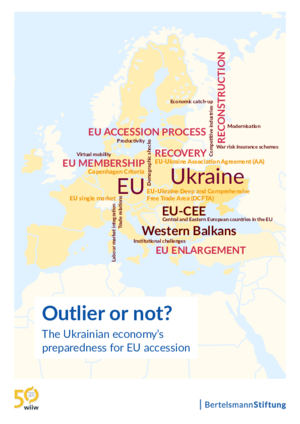Outlier or not? The Ukrainian economy’s preparedness for EU accession
Richard Grieveson, Branimir Jovanović, Miriam Kosmehl, Michael Landesmann, Olga Pindyuk, Alireza Sabouniha, Marina Tverdostup and Stefani Weiss
Joint Study No. 2023-11, November 2023
in cooperation with BertelsmannStiftung
59 pages including 1 Tables and 35 Figures
Ukraine’s status as an EU candidate country has prompted a debate about its readiness for the accession process, and some doubts about whether Ukraine can meet the Copenhagen Criteria to join the EU. In this study, we investigate Ukraine's ability to meet the economic aspects of the Copenhagen Criteria, comparing it with EU-CEE countries at the time of their membership applications and accession. We find that Ukraine is mostly a typical CESEE country, and on many indicators can be compared with the likes of Romania, Poland and the Baltic countries at the time of their application or accession or both. In certain industries, we already find that Ukraine has a decent level of competitiveness, which bodes well for future convergence prospects. When the war ends, if Ukraine receives security guarantees, it can feasibly follow the successful EU-CEE convergence and integration path with the EU. Ukraine’s main weaknesses are its negative demographic outlook, historical difficulties in attracting FDI, and limited level of existing economic integration with the EU. Tackling these issues should be among the main economic priorities when the war ends.
Keywords: Ukraine, EU-CEE, EU accession
JEL classification: F02, F15, O40, O47, J11
Countries covered: Ukraine
Research Areas: Macroeconomic Analysis and Policy, Labour, Migration and Income Distribution, International Trade, Competitiveness and FDI, Regional Development
